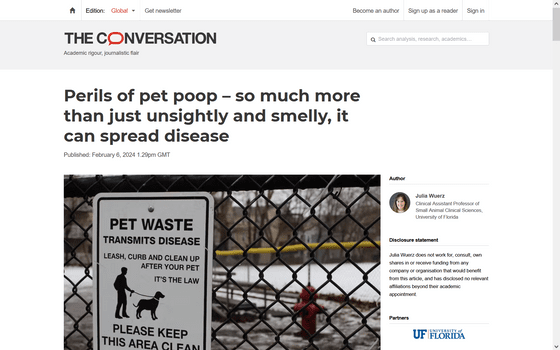If you leave your pet's feces behind without taking them home, it's not only dirty, but there's also the risk of spreading infections.

Pet feces are a nuisance that often causes problems in the neighborhood. Veterinarians have warned that such ``feces'' are not only unclean, but can even spread disease.
Perils of pet poop – so much more than just unsightly and smelly, it can spread disease

It is good etiquette for pet owners to collect their pet waste, but it is often left uncollected on the roadside. Some regions in Italy have
According to Julia Werz, an associate professor in the Department of Small Animal Clinical Sciences at the University of Florida, pet feces are not only dirty, but there is also a risk of developing infectious diseases by coming into contact with them.
For example, in the case of dogs, hookworms, roundworms , coccidia , whipworms, etc. may be hidden in the dog's feces. Wertz warns that hookworms, roundworms, and whipworms in particular are extremely dangerous because they can infect a variety of species, including humans.

These nematodes enter the body through small cuts in the skin or through accidental ingestion. Depending on the type, abdominal pain and loss of appetite may occur, and if the larvae reach the lungs, fever and cough may occur. The larvae can burrow into the eye, causing permanent blindness, and as the hookworms migrate just beneath the host's skin, they can cause a severe itchy condition called cutaneous larval migrans. It is estimated that an estimated 1 billion people worldwide suffer from diseases caused by these parasites.
These nematodes can infect not only humans but also dogs and cats, and they may develop the same symptoms as humans. A 2020 survey found intestinal parasites in 85% of dog parks in the United States, and Wertz says it's a problem that owners can't ignore.

In addition to parasites, feces can carry canine and feline viruses such as parvovirus, distemper virus, and canine coronavirus, and unvaccinated adult dogs, puppies, and kittens are particularly susceptible to other dogs. It can cause life-threatening diseases in cats and dogs.
'If your dog or cat poops in a park, forest, sidewalk, or in your garden, be sure to pick it up,' says Wertz. 'You can shovel it directly into a plastic bag, or you can put the bag over your hand and poop. It's safest to grab a bag and tie the top of the plastic bag. You'll want to leave any watery poop behind, but these are more likely to spread disease.'
Wertz also recommends regular parasite prevention for pets, adding that people should try to minimize their chances of contracting disease.
Related Posts:







